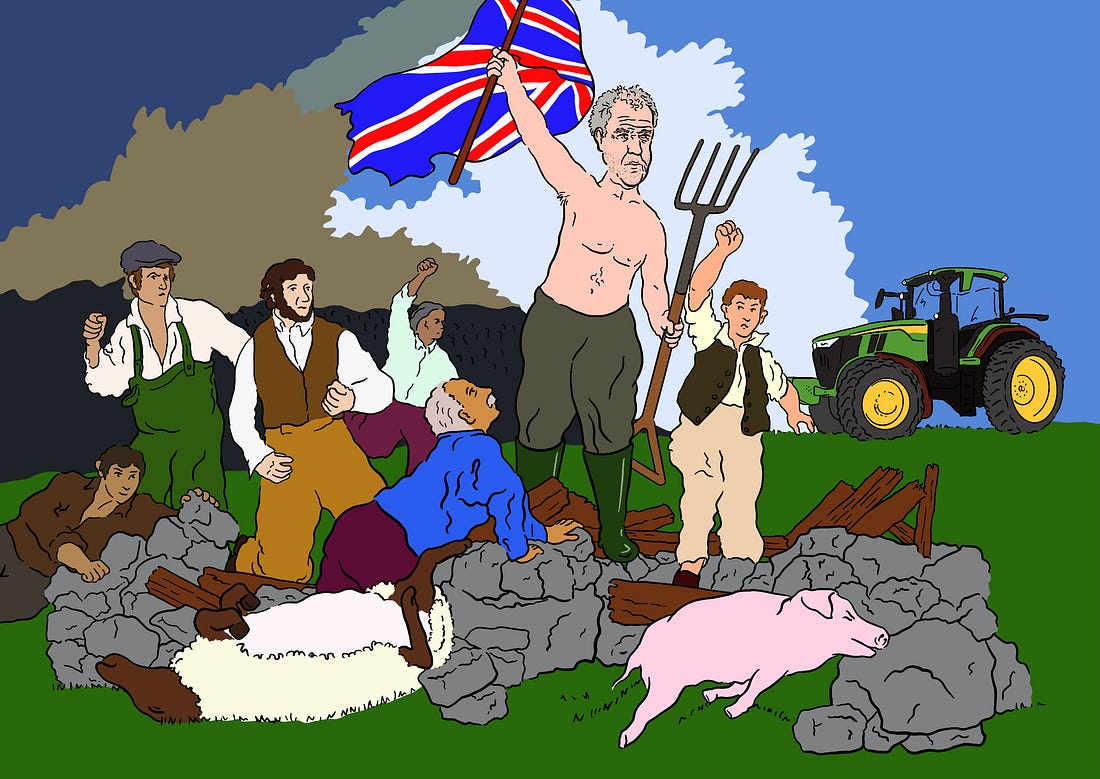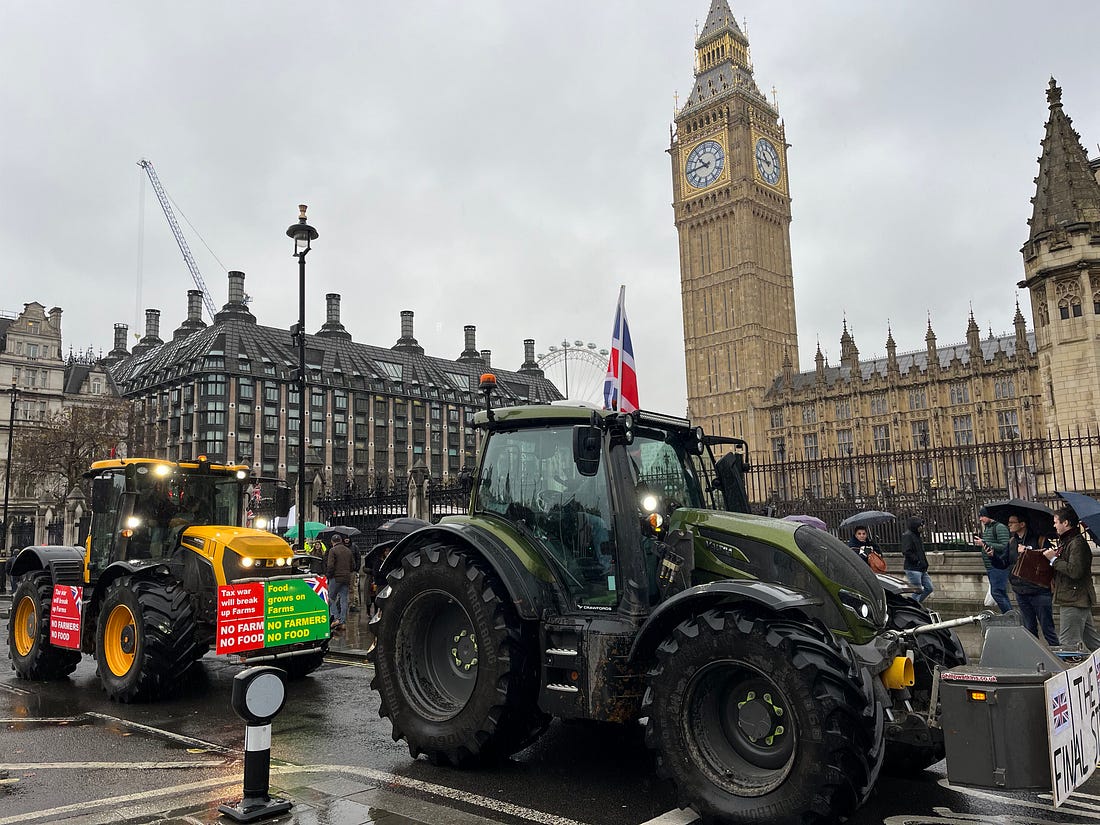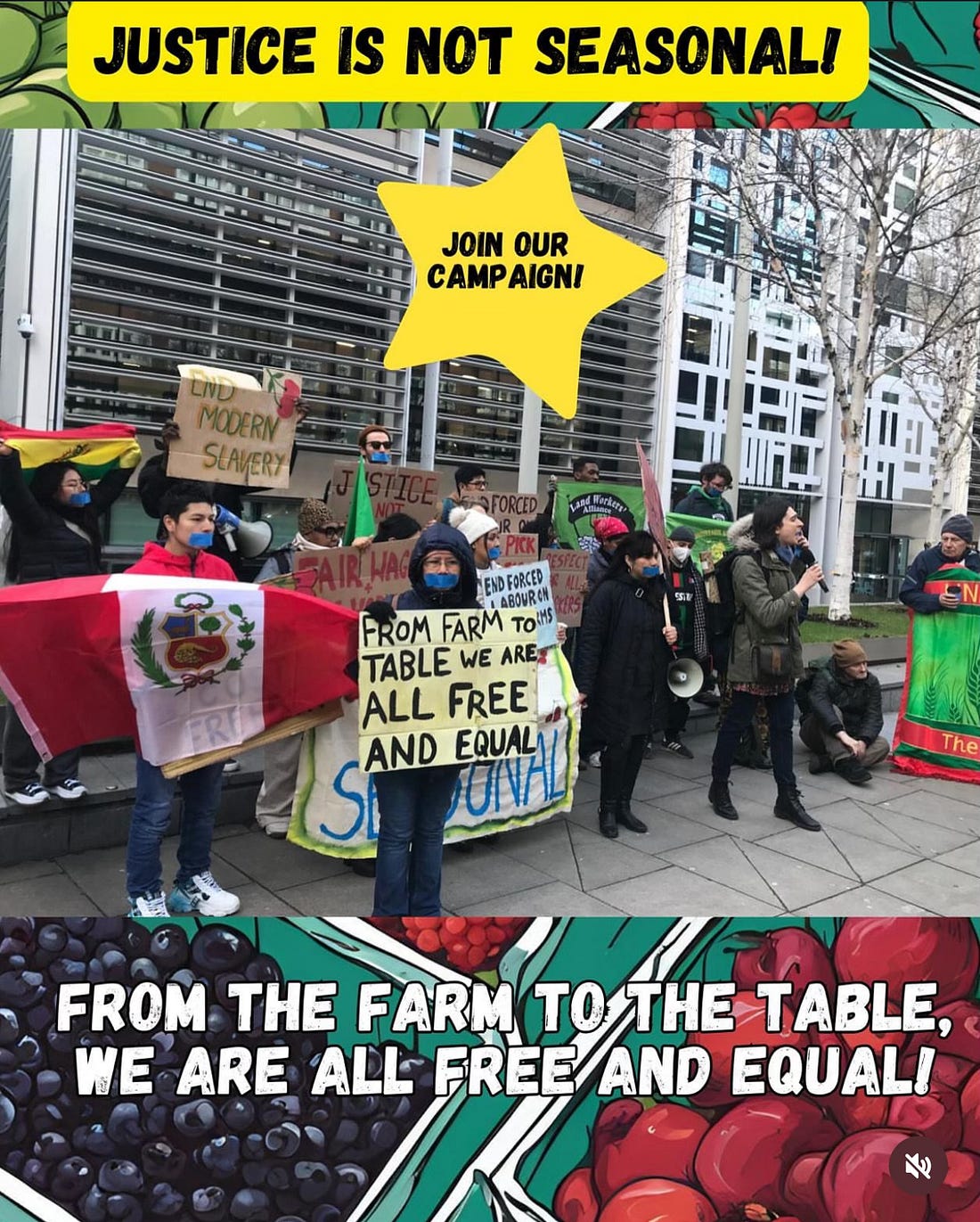Blood, soil, and Jeremy ClarksonDoes Clarkson’s emergence as an unlikely symbol of the farmer protests reflect a worrying rise in far-right agrarian populism? Words by Alex Heffron. Illustration by Alex Brenchley.
Last November, the half-mile from Parliament Square down past 10 Downing Street was lined with thousands of farmers in flat caps, Barbour jackets, and Schöffel tweed. To an onlooker unfamiliar with the fashion of the countryside, it might have looked like most of the protestors were the kind of upper-class type who usually spend their weekends shooting. In reality, regular farming families, with their kids riding toy-sit on tractors, had turned out en masse to protest the government’s proposed reintroduction of inheritance tax on farmland. On the stage, a procession of farmers – and a couple of politicians, including Kemi Badenoch and Ed Davey – gave impassioned speeches. Nigel Farage was blocked from speaking by the organisers, although as he made his way through the crowds, chaperoned by his muscle, there was loud applause and shouts of ‘Go on, Nige!’. But by far the biggest cheer of the day was for Jeremy Clarkson, who in recent years has emerged as a de facto agrarian leader thanks to his wildly successful TV show, Clarkson’s Farm. ‘I lived in London twenty-five, thirty years, and like a lot of people who live in cities … I thought farmers drove round in Range Rovers, moaning until February, and then they all went skiing,’ his speech began. He then moved on to various prevalent concerns among farmers: a perceived unappreciative public; rising costs and poor payments; the BBC’s alleged anti-farmer bias; bloated bureaucracy; and extra challenges imposed by the new Labour government. Clarkson’s speech had the air of a stand-up routine, but there was palpable anger in the crowd that day. It was the first time that a big rural protest had hit London since the massive Countryside Alliance protests of 2002, which were ostensibly in defence of fox hunting, but came just after the devastating foot and mouth disease crisis (which was disastrously handled by Blair’s Labour). Now, as then, farmers wanted to remind the government that they exist. The growing rural revolt had reached the streets of London. Beyond the inheritance tax, there was a deeper pulse of discontent at the heart of the protest. UK farmers feel devalued. With a typical loaf of sliced white bread yielding less than a tenth of a penny to the farmer, it is perhaps understandable that there is a rose-tinted yearning for the apocryphal good old days. This type of nostalgia is prime for exploitation by the far right, who have been a tangible presence at the farmers’ protests. (Given that 99% of farmers are white and that 72% of them voted Tory or Reform in the last election they’re perhaps more open to the lure of right-wing ideology than most.) It’s to this romanticised nostalgia for Britain’s former glory that Clarkson speaks. Clarkson’s Farm is presented as a programme where Clarkson gets things done against the odds and against ‘the establishment’, just like the idealised farmers of the past. It shows him as a hardworking man of the people, rather than a wealthy, privately educated establishment figure (a sleight of hand that Boris Johnson also skilfully deployed). The show’s premise is patently ridiculous, given that Clarkson has openly admitted to having bought Diddly Squat Farm in the Cotswolds (where the show is filmed) as both a shooting estate and a tax dodge. He rented it out for years, until Amazon Studios came knocking with their sizeable cheque book, at which point Clarson took on the farm himself. Yet, watching the show, it is easy to see why a wide cross-section of the farming community has been seduced by Clarkson’s claim that he is a little guy fighting ‘the man’ of big government and big business. The show undeniably portrays something of what it means to farm today. There’s a scene in the first season where Clarkson and his partner Lisa Hogan are trying to round up pigs, wading their way through a thick soup of autumnal mud, the rain belting it down. I couldn’t help laughing as the pigs gave them a proper old runaround, recalling my own hopeless attempts to separate the boars from the sows. Clarkson’s Farm also nails the financial absurdity of trying to produce food profitably in the UK. At the end of the first series, Clarkson tots up the farm’s profit: £144. Rarely does mainstream culture so straightforwardly represent the challenges faced by farmers (who generally view the other main agricultural programme in the UK, the BBC’s Countryfile, as anti-farmer). And it’s not just farmers tuning in: now into its fourth season, Clarkson’s Farm is one of Amazon’s most successful TV shows in the UK. On a recent episode of the Meet the Farmers podcast, a nurse spoke of being inspired by the programme to take up farming as an occupation. The show is even popular in China. Clarkson has a history of xenophobia, misogyny, and anti-worker sentiments. In his columns in the Sun and the Sunday Times, he employs his trademark straight-talking-northerner style to attack young female environmentalists or to rally against ‘wokeness and communism’. During the race riots of last summer, he appeared to implicitly defend the rioters, describing those who ‘go on a march’ in opposition to immigration not as far-right extremists but as people with legitimate democratic grievances, who previously would have been called the ‘salt of the earth’ . Then, the week before the November farmer protests, Clarkson wrote that Keir Starmer and Rachel Reeves ‘want to carpet bomb our farmland with new towns for immigrants and net-zero windfarms’ and ‘ethnically cleanse the countryside of farmers’ – a framing that is particularly grotesque in light of the ongoing ethnic cleansing in Palestine. (Clarkson’s framing is also spreading: in a recent viral clip, a local hunt worker claimed that the journalist was being racist against country folk.) Within Clarkson’s diatribe are clear traces of conspiracies, including both the ‘great reset’ and the deeply racist ‘great replacement’ theories. Clarkson’s call to defend the countryside doubles as a call to defend the British nation, an attempt to rhetorically recruit farmers and country folk into a kind of blood-and-soil nationalism through appealing to the goodness of the salt-of-the-earth farmer. In Clarkson’s polemic, the farmer becomes a bulwark against both Islam and the ‘soy boys’ of the ‘green agenda’. If this all sounds a bit fascistic, it’s because it is. Of course, not every farmer (or casual viewer) who supports Clarkson will read his columns and unambiguously condone his position. Indeed, the views expressed in the columns are conspicuously absent from Clarkson’s Farm (one can only guess at what lies on the cutting-room floor); the focus remains squarely on the often-comedic trials and tribulations associated with trying to make money from the land. Yet it’s impossible to separate Clarkson the entertainer from Clarkson the political agitator. Clarkson’s Farm might not showcase the full breadth of Clarkson’s political views, but it does cement his place as the dominant voice of farming and consolidate his links with farmers more broadly. This, in turn, lends further legitimacy to the bigotry found in his writing, propagating his views into the wider farming community. Given that the majority of the general population supports British farmers, the vision of the farmer that Clarkson wants to paint – as a hard-grafting, common-sense, anti-woke Volk – could lay some of the groundwork to enable a home-grown British fascism to take root. Worryingly Reform seems to be cannily proposing policies that could prove to be popular with farmers, leaning into a return to an imagined good old days, such as a return to the pre-Brexit subsidy scheme (under which farmers received set yearly payments based on the number of acres they managed). Although these proposal are unlikely to be economically viable if enacted, they will appeal to a large faction of the current farming zeitgeist. Meanwhile, Labour continues to make a balls-up of its own agricultural policy, ploughing ahead with its plans for reforming inheritance tax – irrespective of dissent, and the fact the tax is unlikely to raise much money for the Treasury (at best a projected £500 million, or 0.05% of total annual UK revenue). It’s not all smooth sailing for Reform: Farage’s support for free trade, including the importing of chlorinated chicken from the US, received pushback from farmers. Unperturbed, Farage is parroting the racist line that the government is taking away farmers’ land to build homes for immigrants – a conspiracy that began with the Dutch farmer protests in 2022. Organisations such as Together Declaration, which began as an anti-vax and anti-lockdown conspiracy group, have helped to spawn Farmers to Action. This organisation is leading many of the smaller farmers’ protests around the country, and recently disrupted a public appearance by Starmer. If Reform can harness the support of this faction and successfully instrumentalise the positioning of farmers as the vanguard of a common-sense charge against red tape, they could seize the opportunity provided by the Tories’ decline and shore up their popular appeal – in the countryside and beyond. With some people on the right asking if Clarkson is the new Farage, it’s not even difficult to imagine him as the farming Tsar within a Reform government, although he continues to insist that politics is not in his future. Clarkson and Reform have both linked migrants to many of the issues facing farmers. And it’s becoming ever more clear, based on the government’s position on migrants – from its ‘stop the boats’ strategy to Starmer’s recent Enoch Powell-channelling speech about the risk of Britain becoming an ‘island of strangers’ – that the current Labour party similarly positions the racialised migrant as a threat to the nation. This border that Clarkson, Labour, and Reform are all so desperately trying to strengthen isn’t external to the concerns of food and farming – it’s central to producing cheaper food. Labour recently renewed the Seasonal Worker Scheme; this secures tens of thousands of cheap workers, who quietly do much of the back-breaking farm labour that props up huge swathes of the UK food system. The scheme provides a legal environment that makes seasonal workers easier for employers to exploit. If the workers don’t meet the speed required, they can have work taken away from them; if they can’t work, they can’t earn, and they can’t pay off the debt they incurred in obtaining flights and a visa. According to a UN special rapporteur on human rights and modern slavery, the Seasonal Worker Scheme could be in violation of international human rights law, yet no mainstream agricultural commentators or organisations have spoken out against it.
Any real attempt by the left to challenge the far right in the countryside will need to tackle this head-on. Smaller groups – like Justice is Not Seasonal, a protest group formed by Latin American farm workers – have been calling attention to the dreadful working and living conditions they have been subjected to on large corporate farms. So far, the Home Office is ignoring complaints, but growing this resistance into a bigger force might be what anti-fascism on the farm looks like. More recently, the Food in Our Hands march in London called for a ‘unified antifascist, antiracist progressive front within the food and farming sector’, and focused on securing a right to food. (Solidarity Across Land Trades’ recent workers’ inquiry shows that racialised discrimination is a problem within the agrarian left, too.) There’s no point sugar-coating the situation in which we find ourselves. Right now, we’re losing, and the near-term future looks bleak. Agrarian populists like Clarkson offer up migrants as figures for angry, disgruntled farmers to take aim at, and farmers, whether for this reason or others, are turning towards more explicitly far-right parties. Yet it must also be acknowledged that not all farmers support such reactionary viewpoints. Rather than dismissing every farmer as bigoted or out of touch, ways to offer appealing alternatives need to be found. Movements for food sovereignty and agroecology, embodied by the likes of Land in Our Names, Solidarity Across Land Trades, the Oxford Real Farming Conference, and the Landworkers’ Alliance, are at the heart of this counter-hegemonic project within British agriculture. Blandly optimistic and unrealistic visions of the future are not sufficient. The agrarian left must come to directly resist and confront the considerable threat posed by the far right if there is to be any hopeful future to build towards. Clarkson’s Farm, for all intents and purposes the cosplaying adventures of a rich man, cannot be allowed to stand in as the guiding imaginary for British farming. Credits
You’re currently a free subscriber to Vittles . To gain access to our entire back catalogue, you can upgrade your subscription below. |




